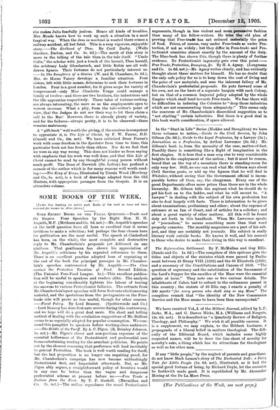SOME BOOKS OF THE WEEK.
[Under this heading we notice such Books of the week as have not been reserved for review in other forms.] SOME RECENT BOOKS ON THE FISCAL QUESTION.—Trade and the Empire. Four Speeches by the Right Hon. H. H. Asquith, M.P. (Methuen and Co. 6d. net.)—Mr. Asquith's speeches on the tariff question have all been so excellent that it seems invidious to make a selection; but perhaps the four chosen here for publication are the most useful. The speech at Cinderford has been, on the whole, the most complete and destructive reply to Mr. Chamberlain's proposals yet delivered on one platform. That gentleman has shown his appreciation of Mr. Asquith's criticisms by his repeated references to them. There is an excellent practice adopted here of reprinting at the end of the book the principal passages in Mr. Chamber- lain's speeches controverted by Mr. Asquith.—The Case against the Protective Taxation of Food. Second Edition. (The Unionist Free-Food League. ls.)—This excellent publica- tion will be useful to speakers and readers alike. The analysis at the beginning considerably lightens the labour of tracing the answeee to various Protectionist fallacies. The extracts from Mr. Chamberlain's past speeches will form first-rate electioneering material, and the quotations from the protagonists on the Free- trade side will prove no less useful, though for other reasons. —Fiscal Policy. By Lord Brassey. (Spottiswoode and Co.) —Lord Brassey has done first-rate service during this controversy, and we hope will do a great deal more. His short and telling method of dealing with the retaliation suggestions of Mr. Balfour seems to us especially adapted for popular consumption. We com- mend this pamphlet to speakers before working-class audiences. —The Riddle of the Tariff. By A. C. Pigou. (R. Brimley Johnson. 1s. net.)—Mr. Pigou's clever and non-partisan exposure of the essential hollowness of the Protectionist and preferential ease forms entertaining reading for the armchair politician. He points out by the clearest reasoning that preference will lead inevitably to general Protection. The book is well worth reading for itself, but the last proposition is no longer one requiring proof, for Mr. Chamberlain's campaign has now become unblushingly Protectionist first, and Imperialist afterwards. ' But, as Mr. Pigou ably argues, a straightforward policy of bounties would in any ease be better than the vague and dangerous preferential scheme at present before us.—Free Trade a Failure front the First. By T. P. Gaskell. (Macmillan and Co. 2s. net.)—The author reproduces the usual Protectionist arguments, though in less violent and more persuasive fashion than many of his fellow-writers. He tries the old plan of proving that Free-trade has not reduced materially the price of food. Prices,rof course, vary under Free-trade as under Pro- tection, if not sp widely ; but they differ in Free-trade and Pro- tectionist countries almost exactly by the amount of the duty. The Blue-book has shown this, though there is plenty of further evidence. No Protectionist ingenuity gets over this point.-- Free Trade, Protection, Dumping, 4.c. By H. A. Agaey. (Longmans and Co. 2s. 6d. net.)—Mr. Agaey writes clearly, and has evidently thought about these' matters for himself. He has no doubt that the only safe policy for its is to keep down the cost of living and the price of raw materials, and sees the inherent fallacy of Mr. Chamberlain's preferential proposals. He puts forward some of his own, not on the basis of a separate bargain with each Colony, but on that of a common Imperial policy adopted by the whole Empire which shall tend towards Free-trade. We fear there will be difficulties in inducing the Colonies to "drop those industries which are not remunerating them adequately." This seems only
• the converse of Mr. Chamberlain's discredited suggestion as to "not starting" certain industries. But there is a good deal in this book worth consideration, if space allowed.


























































 Previous page
Previous page